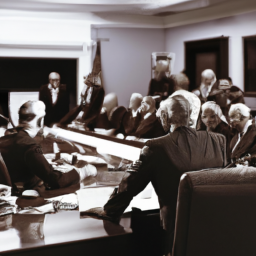As the highest-ranking official in the United States government, the president holds the position of chief executive. This role, outlined in the Constitution, comes with various obligations and powers. The president's responsibilities extend beyond enforcing laws and implementing policies, as they are also constitutionally bound to uphold the principles of the nation. In this article, we will delve into the constitutional duties of the president as the chief executive and explore their significance in the functioning of the government.
The Constitution grants the president the authority to execute laws passed by Congress and to ensure their proper enforcement. This power allows the president to make executive decisions that guide the nation's policies and initiatives. However, it is important to note that the president's authority is not absolute and is subject to checks and balances provided by the other branches of government.
The role of the president as chief executive also involves managing the executive branch of the government. This includes appointing and overseeing executive officials, such as cabinet members, agency heads, and ambassadors. By doing so, the president shapes the administration's agenda and influences the implementation of policies across various sectors.
In addition to domestic affairs, the president's constitutional duties extend to foreign relations. The U.S. Constitution grants the president the power to negotiate treaties and appoint ambassadors, while Congress retains the authority to ratify treaties and oversee foreign policy. This partnership between the executive and legislative branches ensures a balanced approach to international affairs.
The president's role as chief executive is not limited to policy implementation. They also serve as the commander-in-chief of the armed forces, with the responsibility of protecting the nation's security. This includes making critical decisions related to national defense, deploying military forces, and responding to threats both at home and abroad.
One of the key constitutional obligations of the president as chief executive is to faithfully execute the laws of the land. This duty requires the president to ensure that laws enacted by Congress are enforced and upheld by the executive branch. By doing so, the president plays a vital role in maintaining the rule of law and preserving the democratic principles upon which the nation was founded.
The president's authority as chief executive also extends to the power of appointment. Through this power, the president can shape the direction of the executive branch by selecting individuals who share their vision and goals. However, these appointments are subject to Senate confirmation, ensuring a system of checks and balances within the government.
The Constitution provides a mechanism for removing the president from office in case of "high crimes and misdemeanors." This power rests with Congress, demonstrating the constitutional principle of accountability. If the president violates their constitutional duties or engages in misconduct, Congress can initiate impeachment proceedings as a means of enforcing checks and balances.
The president's role as chief executive encompasses a wide range of responsibilities, including crisis management. During times of national emergencies or disasters, the president is expected to provide leadership and coordinate the government's response. This involves working with various agencies, mobilizing resources, and making critical decisions to protect the welfare of the nation.
The president's authority as chief executive is not without limitations. The Constitution places restrictions on the exercise of executive power to prevent abuse and ensure the preservation of individual rights. The judiciary acts as a safeguard, with the power to review presidential actions and declare them unconstitutional if they violate the principles outlined in the Constitution.
